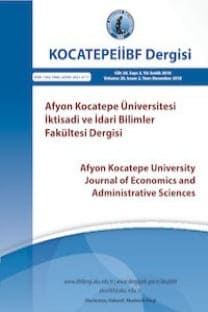ORTAK AVRUPA PROJESİ İÇİN KÜLTÜR BİRLİĞİ
Bu makale Avrupa bütünleşmesi sürecinin Avrupa Birliği‟nin (AB)
kültür birliği üzerinde yaptığı etkiyi analiz etmektedir. AB‟nin uluslararası
önemini destekleyen en güçlü sonucu siyasi uygulamalar ile birlikte ulusdevlet
geleneği ötesinde ve üstünde dikkate değer bir dizi kurumların
kuruluş olmasıdır. Bu, AB‟nin tam olarak işleyen bir siyasi sistem haline
geldiği bir izlenim vermiştir. Elbette Birliği hâlâ güçlü bir süreklilik
gelenekleri ile birlikte, ayırt edici şekil ve yapısını birçok kültürlü karakteri
belirlemiş iken gerçekte son derece homojen bir ülke görünümündedir. Görünüşte adım adım ortak bir Avrupa kültürüne doğru alınan yol kurumlar
sisteminin resmi ve daha az resmi yönleri ile yakından ilişkilidir. Üye
(ulusal) devletlerin henüz katılacağı AB sisteminin kurumlarına bir bağlılık
duygusu vardır. Kültürel açıdan sonuçta bu kararlılık Avrupa bütünleşme
sürecini ayrıntılı incelenmesini gerekli kılmaktadır. Bu genişlemiş
Avrupa'daki bir Avrupa siyasi kültürüne karşılık gelen AB sisteminin
evrimine entellektüel yönünden bakılmasıdır.
Anahtar Kelimeler:
Avrupa Birliği, Kültür, Entegrasyon, Modernleşme
A CULTURAL UNITY FOR THE COMMON EUROPEAN PROJECT
This article analyses the impact of the process of European integration has had on the cultural unity of the European Union (EU). The most powerful outcome underpinning the international significance of the EU has been the establishment of a remarkable set of institutions, together with political practices above and beyond the tradition framework of the nation-state. This has given an impression that the EU has developed into a fully functioning political system. Certainly, the shape and structure of the Union has been determined by a distinctively multicultural character, with still a strong continuity of traditions, whilst in reality it displayed highly homogenous countries. In piecemeal fashion, the road to a common European culture along which the Union seems to travelling has closely associated with the formal and less formal aspects of the system of its institutions. There is a sense of a commitment of the institutions of (national) governments of the member states to the EU system that is yet to be attended. In cultural terms, the upshot of such commitment necessitates to elaborate the process of European integration. This is a sophisticated way of looking at the evolution of the EU system in enlarged Europe brings with it a corresponding European political culture.
Keywords:
European Union, culture, integration, modernisation,
___
- AXFORD, Barrie., BROWNING, Gary K., HUGGINS, Richard, and ROSAMOND, Ben (2002) “Political culture (eds) in An Introduction to Politics”, Routledge, pp.82-119.
- BOMEMAN, John and FOWLER, Nick (1997) “Europeanization”, Annual Review, Anthropol, pp. 487-514.
- BOZOKI, Andras (2007) “Cultural Policy and Politics in the European Union”, Speech, European Commission, Brussels.
- DELHEY, Jan (2007) “Do Enlargements Make the European Union Less Cohesive? An Analysis of Trust between EU Nationalities”, Blackwell Publishing Ltd, Journal of Common Market Studies, Volume 45. Number 2. pp. 253–279.
- DIXON, Jeffrey C. (2008) “A Clash of Civilizations? Examining Liberal-Democratic Values in Turkey and the European Union”, The British Journal of Sociology 2008 Volume 59 Issue 4.
- ECONOMIST (1995) “More-or-less European Union”, Vol. 336 Issue. 7929, 26 August.
- FIELD, Hockey (2007) “EU Cultural Policy and The Creation of A Common European Identity”, Contemporary European Studies, Griffith University, pp.245-255.
- GARNER, Robert., FERDINAND, Peter, and LAWSON, Stephanie. (2009) “Political Culture (Eds) in Introduction to Politics”, Oxford University Press, pp. 298-319.
- HEYWOOD, Andrew (2007) “Politics”, the Palgrave Foundations. KRZEMINSKI, Adam (2000) “Toward a Common European Culture”, World Press Review.
- MAYER, Franz C. and PALMOWSKI, Jan (2004) “European Identities and the EU – The Ties that Bind the Peoples of Europe”, Journal of Common Market Studies, Volume 42. Number 3, pp. 573-98.
- MELANDRI, Giovanna (2005) “The Creation of A European Culture and Identity, Policy Network”, New Ideas for Progressive Politics, Vol. 4.3, 01September.
- NURGENT, Neill (2003) “The Government and Politics of the European Union”, Palgrave. PRIBAN, Jiri (2005) “European Union Constitution-Making, Political Identity and Central European Reflections”, European Law Journal, Vol.11, No.2, pp.135-153.
- RISSE, Thomas (2004) “Social Constructivism and European Integration (eds) in Europan Integration Theory”, Oxford University Press, pp. 159-176.
- ROSSANT, John (2002) “Europe‟s Explosive Identity Crisis”, Business Week, Issue. 3783, 20 May.
- SCHLESINGER, Philip (1999) “Collective Identities, Friends, Enemies, Innovation: The European Journal of Social Sciences”, December, Vol. 12.
- SJURSEN, Helene (2002) “Why Expand? The Question of Legitimacy ana Justification in the EU‟s Enlargement Policy”, Blackwell Publishers Ltd, JCMS 2002 Volume 40. Number 3. pp. 491–513.
- ISSN: 1302-1966
- Yayın Aralığı: Yılda 2 Sayı
- Başlangıç: 1999
- Yayıncı: Afyon Kocatepe Üniversitesi, İktisadi ve İdari Bilimler Fakültesi
Sayıdaki Diğer Makaleler
KIDEM SEVİYELERİNE GÖRE İŞGÜCÜ ÇİZELGELEME PROBLEMİ: HİZMET SEKTÖRÜNDE BİR UYGULAMA
Gülçin BEKTUR, , Servet HASGÜL
BELÇİKA, DANİMARKA, FİNLANDİYA VE HOLLANDA’NIN VERGİ HARCAMALARI GELİŞİMİ
Bekir ELMAS, , Maysam AMANIANGANEH
Hakan TAŞTAN, , Murat AZALTUN, Hüseyin MERT
İŞLETMELERDE KURUMSAL YÖNETİM KAPSAMINDA İÇ DENETİMİN YERİ VE ÖNEMİ: BORSA İSTANBUL’DA BİR ARAŞTIRMA
AKTARMA PROBLEMİNİN OYUN TEORİSİ İLE ÇÖZÜMÜNE YÖNELİK BİR YAKLAŞIM
GÜÇ MESAFESİ ÖRGÜTSEL GÜVENİ ETKİLER Mİ?
Mustafa Abdül Metin DİNÇER, , Yasemin ÖZDEMİR
YARGI KARARLARI ÖRNEKLERİ İLE TÜRKİYE’DE KENTSEL DÖNÜŞÜM UYGULAMALARININ SORUN ALANLARI
